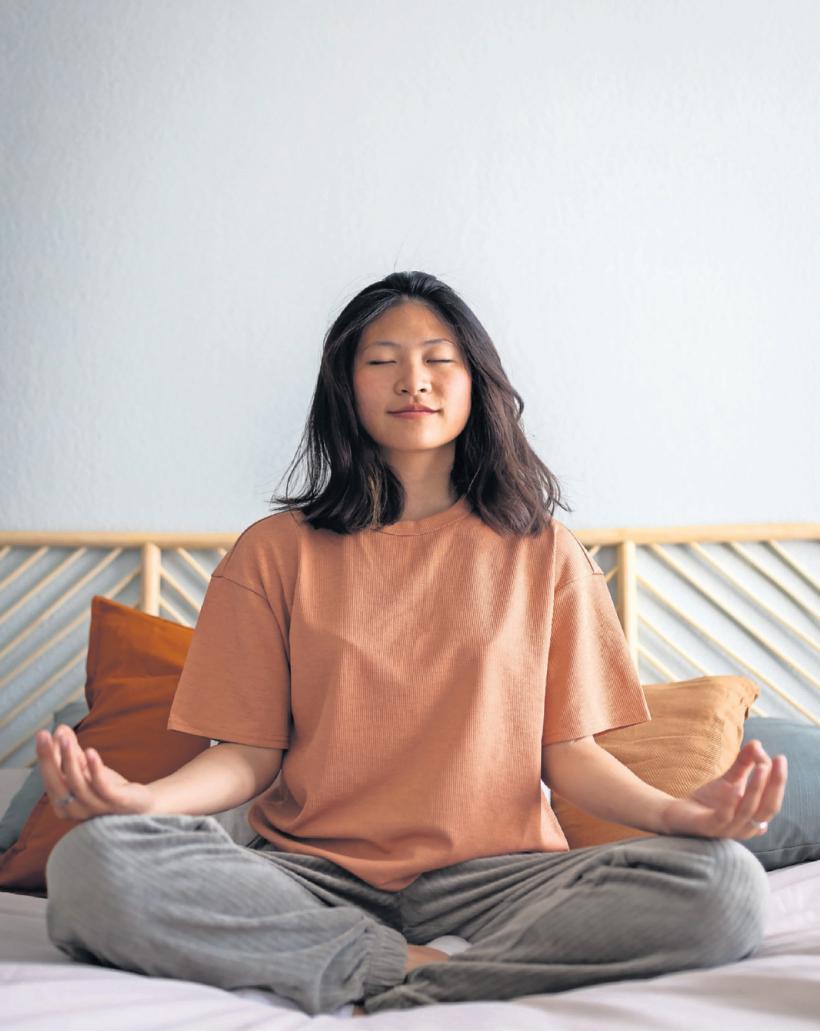Better Health




is one of the factors that allows us to weather the ups and downs of our lives


PROFILES: First-crush couple marry 70 years later, D7
BOOKS: Author infuses novel with love of Puerto Rico, D7
LIFESTYLE: Helping older loved ones and posting about it, D7
 By C ori U rban Special To The Republican
By C ori U rban Special To The Republican
“Good mental health is one of the factors that allows us to weather the ups and downs of our lives” — no matter the season, said Dr. Kate McIntosh, Vice President and Chief Medical Officer for Health New England. “When we have good mental health, we are more able to tolerate change, stress and the unexpected twists and turns that come our way.”
A change in season — from winter to spring or spring to summer, for example — can make some people rejoice and want to get outside more, while for others, the same change of season sends them indoors. Individuals with seasonal affective disorder (SAD) will often feel a significant improvement as the sunshine returns after a dark winter. For the rest of us, however, the emotional impact of summer is not so straightforward. “We expect to feel better in the summer,” continued McIntosh. “It’s clear that summer weather, including sunshine, can affect the levels of certain chemicals in our brains, such as serotonin and melatonin. However, the direct link between weather and mood is small and sometimes surprising. Some studies have found that, although pleasant weather in the spring was as-
sociated with a higher mood, the same effects were not seen in the summer, and hotter weather was associated with lower mood. As a result, it’s important to temper expectations with reality.” It’s ok not to love the summer. Some people really love the heat and the humidity,

but for those who don’t favor summer and dislike heat, she suggests they do whatever makes them comfortable, whether that is staying indoors or being outdoors.
“Exposure to sunlight is thought to increase the brain’s release of a neurotransmitter called serotonin. Serotonin is associated with boosting mood and helping a person feel calm and focused,” said the doctor whose specialty is Pediatrics. Sunlight does also impact our tiredness. “Longer
days may tempt us to stay up later, but loss of sleep can worsen mental health, so it’s important to be sure to get enough sleep.”
Heading into summer, it’s also important to realize that summer foods and increased opportunities for socializing can play a role in one’s mood;
most people, connection with other people is more important than eating, sleeping, or other “wellness” exercises, when it comes to improving mental well-being: “Emphasize human interaction, in person, as much as possible. In-person time is more effective than on-line interaction
enhance well-being and be carried into the fall and beyond. McIntosh recommends:
Connect with supportive people
Try to connect with the people who make you smile and with whom you feel comfortable. Plan a night out, a night
“Warm weather allows for increased outdoor activities, which, again, can positively impact your mood. Individuals can participate in their health plan’s wellness benefits, which may offer incentives for exercise, farmers markets, farm shares, etc.”
Dr. Kate McIntosh - Vice President and Chief Medical Officer for Health New England
healthy eating no matter what season or time of year should be a priority. “Warm weather allows for increased outdoor activities, which, again, can positively impact your mood. Individuals can participate in their health plan’s wellness benefits, which may offer incentives for exercise, farmers markets, farm shares, etc.,” McIntosh pointed out.
Healthy summer foods can often be found at food pantries too.
McIntosh also noted that for
for mental health improvement. We see a lot of writing about ‘finding a purpose’ but if that seems over-whelming, look for opportunities to help others in small ways.”
Helping others makes us happy, whether it’s helping to cook at a barbeque, or taking food to a food pantry. Even small things like calling to check in on someone can have a positive impact on our own mental health.
So there are numerous summertime habits that can
in playing cards or games, or some other social interaction.
Find social balance and activities.
Everyone needs different amounts of social interaction.
Pay attention to what balance works best for you.
Look for ways to help other people, both large and small
Helping others improves your health. The National Institute on Aging has supported research that shows
having a sense of mission and purpose in life is linked, not only to a sense of connection and satisfaction, but also to healthier immune cells.
Volunteering or caregiving for others also helps people feel less lonely.
Get some sunshine
Spring can be rainy, but when the sun does shine, the brightness can give us a mental lift. Try to get outside, even for a few minutes, when the sun is out.
Maintain your sleep patterns
Getting enough sleep has a huge effect on your mental health.
Tend to your physical health
There is a proven connection between exercise and better mental health. Yoga, dancing or even just going up and down the stairs are great examples of indoor exercise. As it warms up, you can walk outside.
But no matter the activity, McIntosh emphasizes that whatever a person chooses to do should be done in moderation and provide an appropriate level of comfort. For more information, go to

Taking steps to safeguard mental health is a vital component of a healthy lifestyle.
The National Institute of Mental Health notes that mental health affects how individuals think and feel, the choices they make, and how they relate to others, which underscores just how important it is to prioritize mental health.
Meditation is a popular practice with a history so lengthy it may surprise even its most devoted practitioners.
According to Psychology
Today, some archaeologists trace the origins of meditation all the way back to 5,000 BCE. The global spread of the practice is believed to have started around the fifth or sixth century BCD, when trading along Eurasia’s famed Silk Road exposed the practice to various cultures.
The lengthy history of meditation is proof that the practice is no mere fad. In fact, people from all walks of life have much to gain from meditation. Novices can start their meditation journeys with this basic rundown of a practice that has inspired devotees for thousands of years.
What is meditation?
The Mayo Clinic notes that meditation is considered a type of mind-body complementary medicine that intends to produce a tranquil, relaxed state of mind. When practicing meditation,
individuals focus their attention and aspire to remove potentially stress-inducing, jumbled thoughts from their mind.
Are there different types of meditation?
The Mayo Clinic reports that there are various ways to meditate. Guided meditation is a popular form of the practice in which individuals form mental images of places or situations they find relaxing. Guided meditation practitioners employ their senses of smell, sight, sound, and touch during a session, which may be led by a guide or teacher. Mantra meditation is another form of the practice in which individuals silently repeat a calming word, thought or phrase. The repetition is designed to block out distractions.
Mindfulness meditation is a popular form of the practice that emphasizes awareness, or mindfulness, and acceptance of living in the moment. The Mayo Clinic notes that individuals practicing mindfulness meditation will focus on what they experience during meditation, such as the flow of their breath, as they attempt to observe their thoughts and emotions.
How do I meditate?
Mindful Communications, which offers corporate training, practical advice and other insights regarding mindfulness and meditation, notes that meditation is both simpler and more complex than most people think. But the following seven-step pro




spectus can serve as a useful foundation for meditation novices.
Take a seat
Individuals are urged to find a calm, quiet place to sit.
Set a time limit
A short session between five and 10 minutes can help novices.
Notice your body
Individuals should be stable and sit in a position they can maintain for a while.
Feel your breath
As you breath in and out, make an effort to feel the sensation of your breath.
Notice if your mind wanders
It’s likely that your mind will wander to other places during your sessions. Pay attention to when it does and then refocus your attention to your breathing.
Don’t judge yourself
Wandering thoughts during meditation are not deserving of scorn. When the mind wanders, simply return to meditating without obsessing over the thoughts that came into your head when your mind wandered off.
Close with kindness
As your session draws to a close, gently lift your gaze and take a moment to notice your surrounding environment, how your body feels and your thoughts and emotions.

Meditation can pay numerous dividends. Information can be found at mindful.org.






The human body is a well-oiled machine that is a wonder of biological efficiency when working properly. The body’s immune system is integral to keeping a person healthy, and it does that by recognizing foreign invaders, such as viruses and bacteria, and then launching an attack to eradicate them. Sometimes, however, the body treats outside substances as harmful when they’re really just nuisances. This is the case with allergens. Allergens, according to eMedicine Health, trigger an immune system response to various substances the body deems harmful. In turn, the body overreacts to these substances, triggering allergic reactions. Allergic reactions may occur in one person and not another. The immune system produces antibodies, which can cause certain effects, including inflammation of the skin, sinuses, digestive system, or airways, depending on the allergen, according to the Mayo Clinic. Many things can trigger allergies, and the Centers for Disease Control and Prevention estimates that more than 50 million people in the United States have allergies. Here’s a look at some of the more common allergies that tend to rear their heads when weather warms up.
The air is filled with pollen come the spring and summer. Freshly blooming grasses, trees, flowers, and even weeds produce an abundance of pollen this time of year. It may coat vehicles outside and make its way indoors when people throw open windows to enjoy warm breezes. Pollen allergies are quite common and cause runny, stuffy nose, itchy eyes, sneezing, watery eyes, and itchiness of the skin or roof of the mouth in some instances. Decongestants tend to be recommended when pollen
count is high. It’s also best to leave windows closed during these times.
Mold are very small fungi with spores that float in the breeze like pollen. Mold thrives in damp areas. Mold may grow unchecked after spring rains or in piles of damp leaves. It also can be found in musty basements or bathrooms. Using a dehumidifier indoors can help alleviate mold, but outdoors it may be a little more challenging to control. When doing yard work in damp areas, wear a mask to avoid breathing in spores.
Chances are the arrival of spring may trigger the desire to do a little cleaning. In turn, it’s highly likely that dust will be disturbed, and along with it, dust mites. WebMD says dust mites are microscopic and people may not even know they are around. Keeping a home free of dusty items can reduce dust mite numbers. Also, cover mattresses, pillows and wash sheets weekly in hot water to help alleviate dust mite infiltration.
We tend to think of allergens in terms of small substances that are inhaled, but insects that are abundant in the warm weather can be troublesome, too. An insect sting or bite can cause hives, itching, swelling, shortness of breath, or even anaphylaxis. While there’s no definitive way to avoid all insects, people can opt against brightly colored clothes and scented lotions or cosmetics. Insect repellents and skipping sweet foods or beverages at outdoor meals also may help.
Seasonal allergies can put a damper on even the most welcoming spring day. After all, a day soaking up the sun isn’t so relaxing when it’s also
spent sneezing and confronting allergy symptoms like congestion, runny nose and watery eyes. Thankfully, it’s possible for seasonal allergy sufferers to have their spring and enjoy it, too.
Pay attention to seasonal allergy trackers. Seasonal allergies are now easier to track than ever. For example, Pollen.com is an easily accessible and free site that allows visitors to type in their ZIP codes and access daily allergy reports for their towns and cities.
Visitors also can see five-day forecasts that can help them plan trips and other outdoor excursions. Weather.com also offers free allergy reports and forecasts. Individuals with seasonal allergies can make use of these sites and plan their activities based on the information they provide.
Stay indoors when allergen levels are high. The Mayo Clinic notes that there are several things individuals can do to reduce their exposure to seasonal allergy triggers. That includes staying indoors on dry, windy days. This doesn’t mean individuals need to lock themselves indoors all spring. But it’s important that seasonal allergy sufferers recognize that some days might be too much to handle. Rain helps clear pollen from the air, so individuals who are avoiding the outdoors on days when pollen counts are high should be able to get outside after a good rain without triggering an attack.
Maintain clean air indoors. The great outdoors is not the only place where allergens percolate. The Asthma and Allergy Foundation of America notes that improving air quality in a home can reduce allergy triggers. Air conditioners can prevent outdoor allergens from entering a home, so utilize units on warm spring days when you might otherwise open the windows. Open windows and screen doors provide easy entry points for allergens like pollen, so turning on the AC when outdoor allergen counts are high can make seasonal allergies more manageable.



Consider treatments. Over-the-counter treatments like antihistamines, nasal sprays and decongestants provide most individuals with sufficient relief from their seasonal allergies. If OTC remedies are ineffective, treatments such as allergen immunotherapy and a consultation with an allergen may be necessary.
Seasonal allergies can spoil an otherwise welcoming spring day. But there are many ways for individuals to corral their seasonal allergies and still enjoy spring sun.